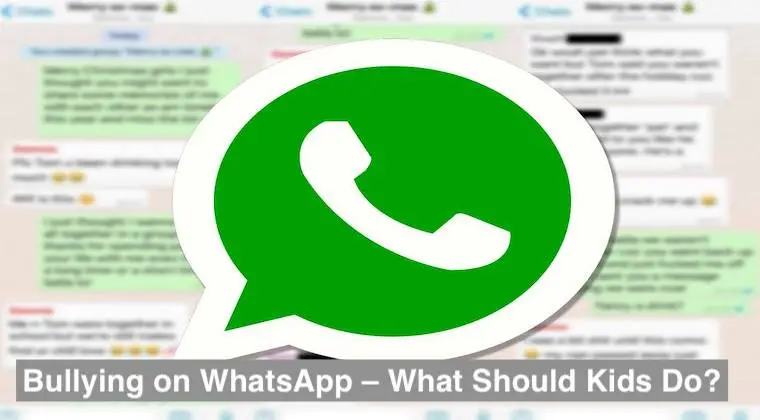+1 845 259 2974 (11 a.m to 7 p.m CST)
Bullying on WhatsApp – What Should Kids Do?

Cyberbullying is when someone uses digital devices to harass or bully another person. It includes sending mean messages, spreading rumors, or sharing private information to embarrass someone. WhatsApp, a popular messaging app, is often used for cyberbullying because it allows users to send messages, photos, and videos quickly and privately.
Children use WhatsApp to stay connected, making it an easy target for bullies. The app’s group chat feature can amplify the reach of bullying, making the victim feel isolated and overwhelmed. It's crucial to address this issue because cyberbullying can seriously affect a child's mental health, leading to anxiety, depression, and low self-esteem.
Recognizing WhatsApp Bullying
Understanding and identifying WhatsApp bullying is the first step in combating it.
Signs of Bullying on WhatsApp
Children being bullied on WhatsApp may show changes in behavior. They might become anxious when receiving notifications or avoid using their phone altogether. Other signs include sudden mood swings, reluctance to attend school, or withdrawing from social activities. If your child seems upset after using their phone, it's important to investigate further.
Common Forms of Bullying Messages
Bullying on WhatsApp can take many forms. It often includes hurtful messages, name-calling, and spreading rumors. Bullies may share embarrassing photos or videos of the victim. Group chats can also be a platform for exclusion and ganging up on one individual. Recognizing these types of messages is crucial in identifying if your child is being bullied.
Impact on Children’s Mental Health
The effects of WhatsApp bullying on children’s mental health can be severe. Victims may experience anxiety, depression, and low self-esteem. They might struggle with sleep disturbances and have trouble concentrating in school. In extreme cases, cyberbullying can lead to self-harm or suicidal thoughts. Addressing these issues promptly can help mitigate long-term emotional damage and support the child's well-being.
By recognizing the signs and understanding the impact, parents and caregivers can take the necessary steps to protect their children from WhatsApp bullying.
How Should Kids Respond?
When faced with bullying on WhatsApp, children need to know how to respond effectively. Here are some crucial steps they should take to protect themselves and seek help.
Do Not Respond
The first and most important step is not to respond to the bully. Engaging with bullies can often escalate the situation. Bullies thrive on reactions, so by not responding, children can avoid giving them the satisfaction they seek. It's crucial to remain calm and not retaliate, as this can make bullying worse.
Save the Evidence
Saving evidence of bullying is essential for reporting and stopping the behavior. Kids should learn how to take screenshots of hurtful messages, photos, or videos. This evidence can be shown to parents, teachers, or authorities to help them understand what is happening. Keeping a record ensures there is proof of bullying, which is important for any actions that might need to be taken.
Block and Report
Blocking the bully on WhatsApp is a straightforward way to stop further harassment. Kids should know how to block someone in their settings to prevent receiving more messages from the bully. Additionally, reporting the bully to WhatsApp can help stop their behavior. WhatsApp has features to report users who violate their guidelines, which can result in the bully being banned from the platform.
Talk to Someone
Encouraging kids to talk to someone they trust is vital. This could be a parent, teacher, or friend. Discussing their experience can provide emotional support and practical advice. Trusted adults can take further steps to ensure the child's safety and well-being. Open communication helps children feel supported and not alone in dealing with bullying.
By following these steps, kids can protect themselves and take control of the situation when faced with bullying on WhatsApp.
Parental Involvement
Parental involvement is crucial in protecting children from WhatsApp bullying. Parents play a key role in recognizing signs of distress, offering support, and using tools to ensure their child’s safety.
Importance of Parents Being Aware
Parents need to be aware of their children's online activities. Knowing what apps their kids use and understanding the potential risks is the first step in prevention. Awareness helps parents identify any unusual behavior that may indicate bullying. Regularly discussing online safety and the importance of reporting any negative experiences can foster an environment of trust.
How Parents Can Support Their Children
Parents can support their children by maintaining open lines of communication. Encouraging kids to share their online experiences without fear of punishment is essential. When children report bullying, parents should listen calmly, reassure them, and take their concerns seriously. It's important for parents to be proactive by educating themselves about cyberbullying and discussing strategies for dealing with it.
Tools and Apps Parents Can Use to Monitor and Protect Their Kids
Several tools and apps can help parents monitor and protect their children online. Parental control apps like Qustodio, Net Nanny, and Norton Family allow parents to track their child's online activity, set usage limits, and block inappropriate content. WhatsApp also offers privacy settings that parents can help their children configure to enhance their safety. Using these tools can help parents stay informed about their child’s online interactions and intervene when necessary.
By staying aware, offering support, and utilizing monitoring tools, parents can play an active role in safeguarding their children from WhatsApp bullying.
Educational Programs and Resources
Educational programs and resources are essential in raising awareness and providing support to kids and parents dealing with WhatsApp bullying. Schools, online resources, and various guides offer valuable information and help.
School Programs Addressing Cyberbullying
Many schools have implemented programs to address cyberbullying. These programs educate students about the impact of bullying and teach them how to respond if they encounter it. Workshops and seminars often include role-playing scenarios to help children understand the importance of empathy and kindness. Schools also provide resources for students who need support, such as counseling services and peer support groups.
Online Resources and Hotlines for Help
Numerous online resources are available to assist kids and parents in dealing with cyberbullying. Websites like StopBullying.gov and Cyberbullying Research Center offer tips, articles, and support for those affected by bullying. Hotlines, such as the National Bullying Prevention Center, provide immediate help and advice. These resources are invaluable for gaining information and finding support networks.
Books and Guides for Kids and Parents
Books and guides can also be beneficial in addressing WhatsApp bullying. For children, books like "Stand Up for Yourself & Your Friends" by Patti Kelley Criswell provide practical advice and encouragement. For parents, guides like "Parenting in the Digital World" by Clayton Cranford offer insights into understanding and managing their children's online experiences. These resources can help both kids and parents navigate the challenges of cyberbullying effectively.
By utilizing school programs, online resources, and educational books, families can better understand and combat WhatsApp bullying.
Building Resilience in Kids
Building resilience in kids is essential for helping them handle and overcome the challenges of WhatsApp bullying. By teaching self-confidence, encouraging positive online behavior, and involving schools and communities, we can empower children to deal with bullying effectively.
Teaching Kids Self-Confidence and Coping Skills
Self-confidence is a crucial defense against bullying. When kids believe in themselves, they are less likely to be affected by negative comments. Parents and educators can help by praising children's strengths and encouraging them to pursue their interests. Coping skills, such as deep breathing, mindfulness, and talking about their feelings, can help kids manage stress and anxiety caused by bullying. Teaching these skills early on prepares children to handle difficult situations more effectively.
Encouraging Positive Online Behavior
Promoting positive online behavior is vital in preventing bullying. Kids should be taught to use social media and messaging apps responsibly. Encouraging kindness, empathy, and respect in all online interactions can reduce the likelihood of bullying. Setting a good example as adults and discussing the consequences of negative behavior can reinforce these values. Creating a positive online environment helps kids feel safer and more supported.
Role of Schools and Communities in Supporting Affected Kids
Schools and communities play a significant role in supporting children affected by bullying. Schools can implement anti-bullying programs and provide resources such as counseling and peer support groups. Communities can organize workshops and events to raise awareness about cyberbullying and its impact. By working together, schools and communities can create a supportive network for children, ensuring they have the resources and help they need to cope with bullying.
Building resilience in kids involves a collective effort from parents, educators, and the community. By fostering self-confidence, promoting positive online behavior, and providing strong support systems, we can help children navigate the challenges of WhatsApp bullying and emerge stronger and more resilient.
WhatsApp bullying is a serious issue that can have lasting effects on a child's mental health and well-being. Recognizing the signs of bullying and understanding its impact are crucial steps in addressing the problem. Kids need to be equipped with practical steps to handle bullying, such as not responding, saving evidence, blocking and reporting the bully, and talking to someone they trust.
Parents play a vital role in this process by staying aware of their children's online activities, providing support, and using monitoring tools. Educational programs and resources in schools and online can offer valuable guidance and support for both kids and parents.
Building resilience in children through self-confidence, positive online behavior, and community support is essential in helping them face and overcome bullying. By working together, we can create a safer and more supportive environment for children, empowering them to handle bullying effectively and confidently.





























